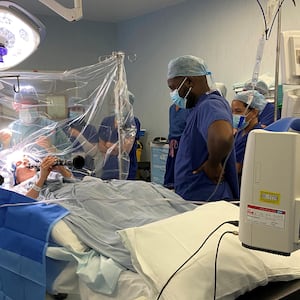Health
Music Helps Parkinson’s Patient During Groundbreaking Brain Surgery

In a remarkable display of resilience, 65-year-old Denise Bacon played her clarinet while undergoing Deep Brain Stimulation (DBS) surgery at King’s College Hospital in London. The procedure, which took place in July 2023, aims to alleviate the symptoms of Parkinson’s disease, a progressive neurological disorder for which there is currently no cure.
As the surgical team prepared for the intricate procedure, Denise remained alert and engaged, using her music to help ease the tension of the moment. While doctors carefully drilled into her skull to implant electrodes, she played melodies that resonated throughout the operating room. This innovative approach showcases not only the technical advancements in neurosurgery but also the profound connection between music and healing.
During the procedure, the implanted electrodes were connected to a pulse generator that sends electrical impulses to specific areas of the brain. These pulses are designed to enhance motor skills and reduce the debilitating tremors and rigidity associated with Parkinson’s disease. The surgery represents a step forward in the management of the condition, offering hope to many patients facing similar challenges.
The use of music during surgical procedures is not entirely new, but Denise’s case highlights its unique benefits in a high-stress environment. Medical professionals have long recognized that playing an instrument can serve as a therapeutic distraction, potentially reducing anxiety and improving patient outcomes. The choice to incorporate the clarinet into her surgery demonstrates a creative approach to patient care.
DBS surgery has gained popularity over the years as a treatment option for Parkinson’s patients. According to the Parkinson’s Foundation, this technique can significantly improve quality of life for those who do not respond well to traditional medication. The procedure typically involves multiple stages and careful consideration of the patient’s specific needs.
Denise’s experience reflects the growing trend of integrating patient preferences into medical practices. By allowing her to play the clarinet, the surgical team not only supported her emotional well-being but also highlighted the importance of patient involvement in their own care.
As she played, doctors meticulously navigated the complexities of her brain, a delicate balance of artistry and science. The surgery concluded successfully, with Denise emerging from the operating room hopeful for improved motor function and a better quality of life.
Post-surgery, she expressed gratitude for her medical team and the opportunity to combine her passion for music with a groundbreaking medical procedure. “It was comforting to play while they worked,” she said. “Music has always been a part of my life, and it felt right to have it there with me.”
The innovative use of music during such a critical moment illustrates the potential for more personalized approaches in medicine. As more patients and healthcare providers recognize the connection between emotional well-being and physical health, similar techniques may become more common in operating rooms around the world.
Denise Bacon’s journey not only sheds light on the advancements in treating Parkinson’s disease but also serves as an inspiring reminder of the power of music in healing. As she looks forward to the future, she remains optimistic about the possibilities that lie ahead.
-

 World4 months ago
World4 months agoTest Your Knowledge: Take the Herald’s Afternoon Quiz Today
-

 Sports5 months ago
Sports5 months agoPM Faces Backlash from Fans During Netball Trophy Ceremony
-

 Lifestyle5 months ago
Lifestyle5 months agoDunedin Designers Win Top Award at Hokonui Fashion Event
-

 Entertainment5 months ago
Entertainment5 months agoExperience the Excitement of ‘Chief of War’ in Oʻahu
-

 Sports4 months ago
Sports4 months agoLiam Lawson Launches New Era for Racing Bulls with Strong Start
-

 World5 months ago
World5 months agoCoalition Forms to Preserve Māori Wards in Hawke’s Bay
-

 Health5 months ago
Health5 months agoWalking Faster Offers Major Health Benefits for Older Adults
-

 Lifestyle4 months ago
Lifestyle4 months agoDisney Fan Reveals Dress Code Tips for Park Visitors
-

 Politics4 months ago
Politics4 months agoScots Rally with Humor and Music to Protest Trump’s Visit
-

 Top Stories5 months ago
Top Stories5 months agoUK and India Finalize Trade Deal to Boost Economic Ties
-

 Health2 months ago
Health2 months agoRadio Host Jay-Jay Feeney’s Partner Secures Visa to Stay in NZ
-

 World5 months ago
World5 months agoHuntly Begins Water Pipe Flushing to Resolve Brown Water Issue









